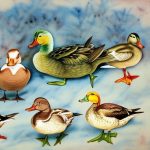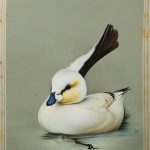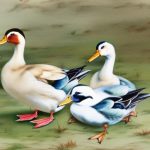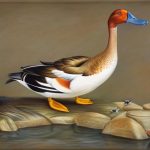Domestic black ducks are a popular breed of duck that are raised for their meat, eggs, and feathers. They are a domesticated version of the wild black duck, which is native to North America. Domestic black ducks are known for their hardiness, adaptability, and calm temperament, making them a popular choice for small-scale farmers and homesteaders. These ducks come in a variety of breeds, each with its own unique characteristics and traits. In this article, we will explore the characteristics, popular breeds, housing and care, breeding and reproduction, common health issues, and conservation efforts for domestic black duck breeds.
Table of Contents
Key Takeaways
- Domestic black duck breeds are popular for their unique characteristics and adaptability to various climates.
- Domestic black ducks are known for their hardiness, good foraging abilities, and calm temperament.
- Popular breeds of domestic black ducks include the Cayuga, Swedish, and East Indies.
- Proper housing and care for domestic black ducks include providing a secure coop, access to water, and a balanced diet.
- Breeding and reproduction of domestic black ducks require proper nesting areas and attention to the health and well-being of the ducks.
Characteristics of Domestic Black Ducks
Domestic black ducks are medium-sized birds with a sleek black plumage that has a greenish sheen in the right light. They have a sturdy build, with a slightly elongated body, a broad chest, and a long, broad bill. Their legs are set far back on their bodies, making them excellent swimmers. Domestic black ducks are known for their calm and friendly disposition, making them easy to handle and work with. They are also highly adaptable and can thrive in a variety of climates and environments. These ducks are excellent foragers and will happily graze on grass, weeds, insects, and other small creatures. They are also good layers, producing a moderate amount of large white eggs that are excellent for baking and cooking.
Domestic black ducks come in several popular breeds, each with its own unique characteristics and traits. Some of the most popular breeds include the Cayuga, East Indie, Swedish Black, and Orpington. The Cayuga is known for its iridescent green and purple plumage, while the East Indie has a striking all-black appearance with a beetle-green sheen. The Swedish Black is a hardy and productive breed with a calm temperament, while the Orpington is prized for its large size and excellent meat production. Each breed has its own unique advantages and can be chosen based on the specific needs and preferences of the farmer or homesteader.
Popular Breeds of Domestic Black Ducks
The Cayuga duck is one of the most popular breeds of domestic black ducks. It is known for its beautiful iridescent green and purple plumage, which makes it a striking addition to any flock. Cayugas are also prized for their calm temperament and excellent foraging abilities. They are good layers, producing a moderate amount of large white eggs that are excellent for baking and cooking. The East Indie duck is another popular breed of domestic black duck. It is known for its striking all-black appearance with a beetle-green sheen. East Indies are excellent foragers and are highly adaptable to a variety of climates and environments. They are also known for their calm and friendly disposition, making them easy to handle and work with.
The Swedish Black duck is a hardy and productive breed of domestic black duck. It is known for its calm temperament and excellent foraging abilities. Swedish Blacks are good layers, producing a moderate amount of large white eggs that are excellent for baking and cooking. They are also highly adaptable to a variety of climates and environments, making them an excellent choice for small-scale farmers and homesteaders. The Orpington duck is prized for its large size and excellent meat production. It is known for its calm temperament and friendly disposition, making it easy to handle and work with. Orpingtons are also good layers, producing a moderate amount of large white eggs that are excellent for baking and cooking.
Housing and Care for Domestic Black Ducks
Domestic black ducks require a secure and comfortable housing environment to thrive. They should be provided with a spacious coop or shelter that is well-ventilated, dry, and free from drafts. The coop should be equipped with nesting boxes filled with clean straw or shavings for the ducks to lay their eggs. It should also have a secure door to protect the ducks from predators at night. Outdoor access to a fenced-in yard or pasture is also important to allow the ducks to graze and forage for food. The yard or pasture should be equipped with a shallow pond or water source for the ducks to swim and bathe in.
Care for domestic black ducks includes providing them with a balanced diet of commercial duck feed, fresh water, and access to pasture or yard for grazing and foraging. Ducks should also be provided with grit or small stones to aid in digestion, as well as access to clean water for swimming and bathing. Regular cleaning of the coop or shelter is essential to prevent the buildup of waste and bacteria. Ducks should also be monitored for signs of illness or injury and provided with appropriate veterinary care when needed.
Breeding and Reproduction of Domestic Black Ducks
Breeding domestic black ducks can be a rewarding experience for small-scale farmers and homesteaders. Ducks reach sexual maturity at around 5-7 months of age, at which point they can begin mating and laying eggs. To encourage breeding, it is important to provide ducks with a comfortable and secure nesting area filled with clean straw or shavings. Ducks will typically lay their eggs in the early morning hours, so it is important to check the nesting boxes regularly for fresh eggs.
Once the eggs are laid, they can be collected and placed in an incubator or under a broody hen for hatching. Duck eggs typically take around 28 days to hatch, at which point the ducklings will need to be provided with warmth, food, water, and protection from predators. It is important to provide ducklings with a balanced diet of commercial duck starter feed and access to fresh water at all times. Ducklings should also be monitored closely for signs of illness or injury and provided with appropriate veterinary care when needed.
Common Health Issues in Domestic Black Ducks

Domestic black ducks are generally hardy birds that are resistant to many common poultry diseases. However, they can still be susceptible to certain health issues if not properly cared for. Some common health issues in domestic black ducks include respiratory infections, parasites, bumblefoot, and injuries from predators or accidents.
Respiratory infections can be caused by poor ventilation, damp bedding, or exposure to drafts. Symptoms may include coughing, sneezing, nasal discharge, and difficulty breathing. Treatment may include isolating affected birds, providing supportive care, and administering antibiotics as prescribed by a veterinarian.
Parasites such as mites, lice, and worms can also affect domestic black ducks. Regular cleaning of the coop or shelter, as well as providing dust baths with diatomaceous earth, can help prevent parasite infestations. In severe cases, treatment with parasiticides may be necessary.
Bumblefoot is a condition caused by bacterial infections in the feet of ducks. It can be prevented by providing clean bedding, regular foot inspections, and maintaining dry living conditions. Treatment may include cleaning the affected area, applying topical antibiotics, and providing supportive care.
Injuries from predators or accidents can also occur in domestic black ducks. It is important to provide secure housing and fencing to protect ducks from predators such as foxes, raccoons, and birds of prey. Regular inspections of the coop or shelter can help identify potential hazards that could cause accidents.
Conservation Efforts for Domestic Black Duck Breeds
Conservation efforts for domestic black duck breeds are important to ensure the preservation of these unique and valuable birds. One way to support conservation efforts is by promoting responsible breeding practices that prioritize genetic diversity and breed standards. This can help prevent inbreeding and maintain healthy populations of domestic black ducks.
Another way to support conservation efforts is by participating in breeding programs or organizations dedicated to preserving rare or endangered duck breeds. These programs often provide resources, education, and networking opportunities for breeders interested in conserving domestic black duck breeds.
Additionally, supporting local farmers or homesteaders who raise domestic black ducks can help promote sustainable agriculture practices that benefit both the environment and the animals. By purchasing products such as duck meat, eggs, feathers, or live birds from responsible breeders, consumers can help support the conservation of domestic black duck breeds.
Overall, conservation efforts for domestic black duck breeds play a crucial role in preserving genetic diversity, promoting sustainable agriculture practices, and ensuring the long-term viability of these valuable birds for future generations.
If you’re interested in domestic black duck breeds, you may also want to explore the fascinating world of quail breeding. Poultry Wizard’s article on “Do Quails Sit on Their Eggs?” provides valuable insights into the incubation process of quail eggs and the behavior of these small game birds. Understanding the similarities and differences between duck and quail breeding can offer a well-rounded perspective for poultry enthusiasts.
FAQs
What are domestic black duck breeds?
Domestic black duck breeds are a type of duck that has been selectively bred for specific traits such as size, color, and temperament. They are often raised for their meat, eggs, or as pets.
What are some common domestic black duck breeds?
Some common domestic black duck breeds include the Cayuga, Black Swedish, and East Indies. These breeds are known for their dark plumage and are popular among duck enthusiasts.
What are the characteristics of domestic black duck breeds?
Domestic black duck breeds typically have dark plumage, ranging from a deep black to a dark iridescent green. They are medium to large in size and are known for their calm and friendly temperament.
What are the uses of domestic black duck breeds?
Domestic black duck breeds are often raised for their meat and eggs. They are also kept as pets or for ornamental purposes due to their striking appearance.
How do you care for domestic black duck breeds?
Caring for domestic black duck breeds involves providing them with a suitable living environment, a balanced diet, and regular access to water for swimming and bathing. They also require protection from predators and proper veterinary care.
Meet Walter, the feathered-friend fanatic of Florida! Nestled in the sunshine state, Walter struts through life with his feathered companions, clucking his way to happiness. With a coop that’s fancier than a five-star hotel, he’s the Don Juan of the chicken world. When he’s not teaching his hens to do the cha-cha, you’ll find him in a heated debate with his prized rooster, Sir Clucks-a-Lot. Walter’s poultry passion is no yolk; he’s the sunny-side-up guy you never knew you needed in your flock of friends!







